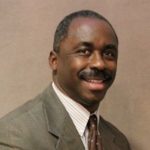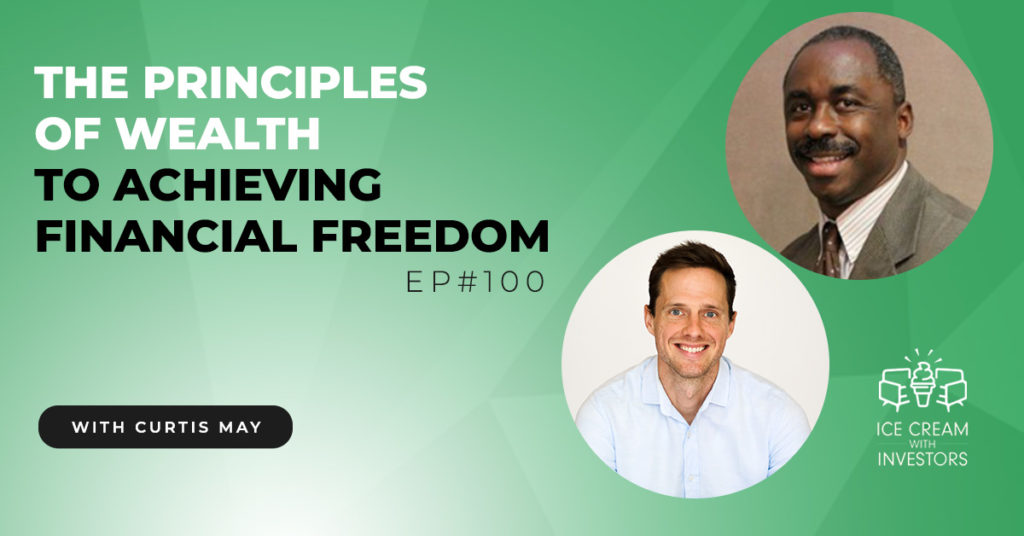Do you want to work your whole life saving up for retirement so when the time comes, you can finally live the life you want? Or do you want to live the life you truly deserve now while working because you want to and not because you have to? In this episode, Curtis May, owner of Practical Wealth Advisors and host of The Practical Wealth Podcast, shares his unique program focused on creating work optional income. He talks about the three rules of investing and how you can acquire more assets and bring in more cash flow. Don’t miss out on this chance to know how you can find the money you don’t even know you are losing and learn the principles of wealth so you can become and remain financially free.
Guest Links:
- Curtis’ Podcast: https://www.podpage.com/the-practical-wealth-show/?fbclid=IwAR3xVbIoz_edC7Ccggf6ZtkoygfgyF0tiUkQnh1klSGwoYjj4gsh99EPbFs
- Curtis’ website: https://curtmay.clickfunnels.com/presell-page22061466
- Curtis’ Instagram: curtismay4766
- Creating wealth using the velocity of money text Pwealth to 55444
- Curtis’ YouTube channel: https://www.youtube.com/c/CurtisMay
—
Watch the episode here
Listen to the podcast here
The Principles Of Wealth To Achieving Financial Freedom With Curtis May
We have on Curtis May. Curtis is the Owner of Practical Wealth Advisors and host of The Practical Wealth Show. His primary focus is on financial planning and helping individuals and families become financially free by following the principles of wealth creation that have endured centuries around the world. As host of the popular podcast, The Practical Wealth Show, and as individual meetings with clients, Curtis teaches people that their number one asset is their knowledge. The more you know, the lower the risk and the greater chance of success. Curtis has been planning for individuals for more than 35 years. He’s passionate about helping his clients save money and live their best lives. Curtis, welcome to the show.
Thanks for having me. I’m excited to be here.
We like to start with the difficult questions. What’s your favorite ice cream?
I’m boring. My favorite ice cream is vanilla. Everywhere I go, I like getting good vanilla ice cream.
With toppings or no toppings?
No toppings. I like straight, good homemade. They are all the same, and I saw vanilla. I’m a vanilla ice cream connoisseur. Maybe cookies and cream but that’s it. Those are the only two I like.
You are in the Philly area. I’m assuming there are some fantastic ice cream shops in the Philly area. If we are up there, where’s the best place we should go?
I live just outside of Philly. There’s a bunch of little places up here but there’s a place my daughter loves, Surreal. They put it in a Mason jar. She gets it with all the sprinkles, these toppings, and cookies jammed in there. It’s this whole thing. This is the cup, and the ice cream sits high. It’s insane. For the two of us is $23. It’s not inexpensive but it’s good. It’s delicious. It’s the experience. A lot of Villanova students go there for dates. The other one is called Scoops.
Investing is a plan. It’s not a product or a procedure.CLICK TO TWEET
Speaking of the scoop, what’s the scoop? What do you do now?
What I do is I work with real estate investors, small business owners, and professionals that want to be wanting with the goal of creating what we call work optional income. You said financial planning. I do principles-based planning. I teach the opposite of what most people are taught, where you are taught to accumulate money and save and hold markets go up. I teach people to focus on cashflow. That’s what I do. I work with people. We help them develop a game plan. We’ve got a program that puts the pieces together where we give you a visual, a one-page or where they are financially. I want to know where they are going.
My goal is to get you from point A to point B, wherever B is for you, financial freedom, which we call it, getting to a position of FU. We got a whole magazine called the Cashflow, and a membership called the Money for Life Club. We have the twenty principles of FU. The goal is passive income twice your expenses. If you want to get the speech that drives this whole thing, do a YouTube search on The Gambler with John Goodman and Mark Wahlberg. That scene is the whole driving force for my whole business, freedom, what is FU. Watch that. Search FU on YouTube, and you will see that that’s the driving force behind our business.
I love this idea of focusing on principles. We are going to dig into those. One thing I didn’t want to breeze over is this idea of work optional because, in so much of the financial independence community, you hear about people retiring early. I don’t believe that anybody with the grit and the determination to “retire” early goes and retires. They work on different things. Work optional is probably the best way I’ve heard that said.
Retirement is a socialist agricultural term that means to withdraw or to put it out of use. I don’t think retirement. I call it financial freedom or being able to do what you want to do instead of what you have to. That’s a better goal because you don’t want to take yourself out of service, which is what retirement means, put out of service. You have to have the right thing. You may like to be a school teacher but you love it or you like what you do, or let’s say you are in the tech world but want to teach it to high school kids. You can’t make the money.
You are used to making six figures. If you can develop assets that generate the income you need, then you are free to do what you want to do with your top. I tell people, “If you dropped $1 billion on me, I would still do this. I would still teach Financial Literacy classes. I would probably be a high school basketball coach.” Maybe even middle school because I like them younger. I could still beat most of them. Probably, girls, I think about no attitude. I’ve coached girls’ soccer and girls’ youth basketball. Girls are more fun. They don’t talk back to the coach when you tell them what to do.
You work with a lot of investors out there, business owners, real estate investors, and high-net-worth individuals. Where do you see real estate fitting into an overall financial plan of taking someone from A to B, for instance?
Investing as a plan. It’s not a product or a procedure. You have to become. It’s about becoming. It’s B, then do the half. You have to become an investor. You got to take your time to learn how to do it. The three rules of investing are investing in your expertise, investing in what you can control or influence the outcome, and don’t chase returns. We will take to an exercise car, retirement ready or not. Most people are taught what I call the accumulation theory, the idea that you can build up all this money in a 401(k), and then you can retire off of that, live off that, and hope you don’t die before you are out of money. That’s the plan.

Principles Of Wealth: Having financial freedom or being able to do what you want to do instead of what you have to is a better goal because you don’t want to take yourself out of service, which is really what retirement means.
That is flawed on many levels. If you want $100,000 in stock, you need $100,000 for the most part. If you want $100,000 worth of real estate, how much do you need? The true answer is that it depends. It depends on how much you know and how creative you are but you can do it with leverage. One, it gives you leverage. It puts you on the same side as the powers that be who want to drive inflation. If you own assets, that inflation drives the asset prices up. It drives up your rent. You are buying an asset with fixed money. While your rents are going up, your mortgage is constant.
You get the write off the mortgage debt, and you get depreciation. If your readers are high-income W-2-ers, it’s almost not optional. When you talk about taxing the rich, you are talking about you. I was in lunch with Tom Wheelwright, Tax-Free Wealth. We were at a conference together and talking about the cash required. He says, “E’s pay 40%, S’s pay 60%, B’s business owners pay 20%, and I’s pay 0%. The tax code is a stimulus program.”
It can’t take all your money. They put carrots where they want stuff done. What does the government want done? They want jobs and housing. Your product is what? Safe, clean, affordable housing. To incent you to buy that, they will give you a significant tax break to offset other stuff. I don’t give tax advice. Go read a book. Go talk to your person.
What does the government want? Jobs, housing, food, and energy. If you will partner with them, you will minimize taxation. Real estate is simple. It’s not easy but it’s simple. As you get into it, you can use other people’s money. If you syndicate, you make a lot of money. You could still get some of the past through tax advantages. There are a lot of ways to skin a cat. You’ve got to figure out what you like. For people that are high income, it’s a good way to develop optional work income. The emphasis is on cashflow. Too many people are focused on capital gains. You need to buy assets. What’s an asset? I’m going to send you a check every month. I don’t think we have been trained to do that.
Two things I want to pull out of there. One is that you brought up a controversial topic that I 100% agree with, which is that the tax code in America is not meant to raise revenue. It is meant to incentivize private entities and private people to do things that the government wants you to do, such as jobs, food, housing, and energy. Housing is a big one because the government doesn’t want to house all these folks.
They’ve already tried that. That wasn’t a good look.
That’s why they give tremendous tax breaks for it.
The administration may not be pro-oil but pro-energy. Rich people don’t care, “Let’s go buy some solar. Let’s go do this and that.” They are not worried. They don’t think about who’s in charge. It doesn’t matter. That’s why you got to get to the position of FU, and it doesn’t matter. You know what’s going on. A lot of people say, “It’s not fair.” It just is. I tell people, “Don’t hate the player, hate the game.” You got to understand the game and the rules and learn how to play the game, which is all you can do. That’s my feeling about it. I try to understand the game. I don’t get mad like, “How does it work? Don’t change the rules on me,” and then Curtis is going to figure it out.
You have to work on your skillset because specialized knowledge is what makes money.CLICK TO TWEET
I also want to talk about this point of accumulation versus cashflow because one of the riskiest things you can do is tie yourself to a single source of income. “I am on a W-2 now. I like my W-2. I plan on being there for a long time but I’ve also had things in my experience that have helped me learn that previous employers have helped me learn that time myself to that income was risky.”
The conversation is shifting in the financial planning from accumulating as much as you can, stick it in a tax-deferred vehicle, which means that you will still pay taxes on it eventually on the harvest rather than the seed. Two, cashflow, to replace your income, to make work optional. Where did you learn this concept? Where do you help your clients navigate through this?
It’s not changing at all in the traditional industry. That’s not what they talk about. That’s not their objective. Their job is not to make you rich. Their goal is assets under management. I’m not throwing them under the bus. You got to understand what your interests are and what theirs are, and they are not aligned. For the first fifteen years of my career, I was like a Dave Ramsey on steroids. Invest the difference, mutual funds, or the end all be all. 1999, 2000, I read Rich Dad Poor Dad. That cracked my foundation. I didn’t know what to do with it but I knew I had grown up in business, and it spoke to me a little bit more than now living through four crashes.
I read it before 9/11 but then the fourth one was 9/11, the whole early 2000. During the meltdown, I was in the mutual fund world but playing with mortgages. When 2008 happened, I was like, “Something is going to happen. Why do I not see this stuff coming?” I started to study Economics. I started to think macroeconomically and looking at some of those things. I started studying Austrian Economics. At that time, I read the book, Becoming Your Own Banker, but working my way through that bibliography, The Creature from Jekyll Island. I’m a big fan of Garrett Gunderson’s book, Killing Sacred Cows.
All of that started to shift me. There are two schools of thought when it comes to money. Two things, people want to focus on their income statement but income is not wealth. Income is income. The problem is with a job, you can get fired for 1 or 2 reasons, any reason or no reason at all, at least in Pennsylvania. I view that as risky. I don’t know about you. That’s like being a consultant but you only have one client. One is the worst word in business. You need to have what I call a West Coast offense for your money. You spread the ball around, and you need to be able to have, dump it off.
You got to be able to move the ball around the field. That’s having multiple streams of income, preferably with leverage. The accumulation theory is considered typical traditional wisdom, which is buying whole, dollar cost average, get out of debt, buy in term of invest the difference, modern portfolio theory, the Rule of $72 cost averaging. It’s all built around the S&P. That’s what the institutions teach. Here’s the other thing, guys. If you are trying to be an investor, typical financial advice is designed for employees because they are teaching you don’t have the time or the training to manage your own money personally. In so many words, all of their marketing says, “Give your money to us.”
The people I worked with were like you. I was talking to a friend of mine, a big multifamily guy here in Philly. He was interviewed on his show doing training for his group. I said, “Do you think you can make your portfolio make more money than Fidelity or Vanguard?” He goes, “Hell yeah.” What happened now? If I were a typical guy, I would be trying to sell you a why you should set up us up or you should put money in mutual funds. In other words, send your money away from your business and give it to somebody else where you might get 4%, 5%, 6% or 7% average with risk. That’s counterintuitive. You know better already. I teach people to do it.
I say, “Here’s what I call the velocity method.” Velocity is the economic principle of moving money. The BRRRR Method will be velocity in real estate. There’s cashflow and leverage. What do banks do? Banks buy permanent life insurance. They don’t buy term insurance. They buy a whole life. What happens is you can do that. All of those what I call corporate finance things to work in personal finance. It supports you in buying even more real estate or expanding your business even more.

Principles Of Wealth: Income is not wealth. With a job, you can get fired for one or two reasons, any reason or no reason at all.
Liquidity is key. Most people are taught to invest, which is to send money away from you. I want you to capitalize, which is to create value. Ideally, you want to be able to collateralize and not liquidate it and go use that money that you saved to go buy other assets that bring in more cashflow. That’s philosophy. It’s cash, asset, cash. You get into what Laura Landmark calls a wealth cycle.
A couple of things I wanted to highlight there. One, my biggest learnings came when I shifted my mindset from accumulation to buy. Save $100 a paycheck. When it gets to $1,000, go buy. I changed it from that to velocity of money, “How fast can I move this money through the system versus accumulating it up, dropping it to zero, building it back up, dropping it to zero.” The second thing is this idea of liquidity and access to cash more than anything. “Cash is trash” but access to cash is as good as cash in the bank sometimes. There’s where whole life policies come in, where you can stuff them in a vehicle that is guaranteed, protected, regulations around it, and then access based by collateralizing that and moving it into other things.
That’s key. Now you get to have your cake and eat it too because you can buy the asset but your money is still earning uninterrupted, compounding, tax-free, credit protected, a death benefit, earning dividends, all that good stuff. You can still turn around and use it for down payments for your properties, vacations, any major capital purchase or investment. Whatever your heart desires, you can think about it.
The mistake people make with what they call infinite banking is that too many people think it’s about the insurance. All they want to see are illustrations. I rarely show people illustrations, at least not initially, because banking is a process and a concept. The product to facilitate banking is a properly structured dividend paying whole life with a mutual company but you have to understand the product.
You don’t need a policy for the bank. It’s more that you got to get the concept, and then we will layer in and show you how to use the product but I need you to understand how banks make money and manage your cashflow. All the banking is, you experienced it because you do it, it’s a system of money management. It’s not about the insurance. Cash has got to be stored somewhere. Nelson Nash has a book called Building Your Warehouse of Wealth. You have to store your liquidity somewhere. You want to store it in a plan that you own, that the government can change the rules on you.
Do you want to store it in real estate? A lot of people think real estate owned, free, and clear as savings. It is not. When you pass on your mortgage, for example, which I believe is a complete waste of money, you are turning your properties into a qualified plan for residential. You got to qualify to get the money back out. I want lines of credit. I want you to use it because velocity is leveraged. What happens is if you had extra money to pay down a mortgage, I would rather have you put in a policy because now you can get to it. It’s a question of location.
Do you want to locate it in the house? Equity has a zero rate of return. Do you want to locate it where you are earning a safe rate that is accessible with a fax or a phone call, and you can turn around and use it? If you have, let’s say, a mortgage of $100,000 of cash or cash value, you are not in debt. You have debt but that’s a balanced neutral decision. You could pay it off but if you hang around me long enough, you know you don’t want to do that. You got the money, you can pay it off but it’s better to let the Fed to show you the debt for you.
By the way, when you are talking about paying down equity and things like that, it’s still accessible to creditors as well. If you think you own your house free and clear, stop paying your taxes and see what happens. If you think you own on your house free and clear in your personal name, get into a car accident where your insurance is over-leveraged, and now all of a sudden, they will come after your collateral, which is your house.
Build your network. It’s all about who you know and, more importantly, who knows you.CLICK TO TWEET
That’s where principle two comes in on my process, maximum protection. Stuff happens. You have to play defense. A lot of people don’t have umbrella policies where it could have $1 million or $2 million for each house in an LLC. “I’m good with that.” but your first line of defense is insurance. It’s not asset protection. That’s your second line of defense but your first line of defense lets insurance company lawyers go to work for you.
All of this comes down to two things. One, you are your greatest asset. No one will care about your future more than you and maybe your parents. Why do you want to hand that off to someone else at some of these big financial institutions? If you don’t care about finance and don’t want to learn it, maybe that is a safer place to put it.
If you are reading this type of content, then you have the ability to go be your greatest asset, and you should pursue that. The second thing it comes down to is control and who can control your money the best. If you are going to pay 2% for somebody to manage it at a big financial institution, not only are you losing control in those investment decisions but you are also paying a fee for that loss of control. Any thoughts on that?
I was talking to somebody. I said, “You do investments,” but I showed her how to read her statement. This was before we jumped on this call. She was like, “Money is losing money.” I said, “Tell me what it says.” “A short-term fund.” I said, “It sounds like a money market fund.” “It is. Do you have a plan for what you want to do with the money?” “It’s $20,000.” I said, “No, leave it there. You could call them and see if they do an S&P fund.” She’s not willing to learn anything about money. If you are not willing, you should go ahead and find your 401(k). You listen to Dave Ramsey.
They are great for you because you don’t want to learn money. You want somebody to tell you what to do. I tell people all the time, “If you are like that, don’t call me. I can’t help you. Do not call Curtis. He is not a good guy to work with you and your money because it’s your money.” Your number one asset is you. What do you invest in? Your mindset, what you read, watch, listen to, and skillset because money follows value. You should be investing in how to raise private money, how to do lease options, and how to negotiate. Reading Chris Voss’s book, Never Split the Difference. You’ve got to work on your skillset because specialized knowledge is what makes money.
If you read Think and Grow Rich, it’s not about investing. It’s about working on your number one asset, which is you. There’s no investment advice in there but it’s a book about getting rich and the Laws of Success. That’s funny. It’s all about your principles, and then it’s your network. Who do you know? More importantly, who knows you? If I’m going to invest in myself, those are the three things. Your number one investment is A or your business. One of the things I’m trying to do is get people real estate investors to understand you are in business. You have a business. You have a real estate business, and you have to learn to operate accordingly.
How do you pay yourself? How do you get money out? The business is a tool for you to become financially free. I don’t think enough people in business or even in real estate are just doing deals or making money but they don’t have a focus, as odd as that sounds, because they are doing well. They leave gas because they don’t have the proper insurance, the entities, the trust, proper life insurance, and not having the full coverage on their car insurance from the liability side.
I see many because I go over all that stuff with them. I get there. We literally go through all their deck pages and look at your stuff. We have a detailed process because you got to build your house on rock, not on sand. Sometimes we have to backfill. You are already doing well, and then we have to backfill to make sure that we are building what I like to call a fortress balance sheet. I stole that from Jamie Dimon but I’m trying to apply it to personal finance.

Principles Of Wealth: Profit first is a strategy of organizing your cash flow so you can pay yourself and make a cash flow management system.
One of the things I wanted to pull out here, though, is this concept of if some people don’t want to learn about money and don’t care to go spend that time that we do, learning about this because it’s not a passion for it. I want to make sure I say, “That’s okay. I work at W-2. I like what I’m doing. I’m going to keep doing what I’m doing.” Some people want to leave their W-2, that’s okay.
One of the things that bothers me about the financial community is that you see so much assets under management, doors owned, and all of these different metrics to signify success. What I care about is the return on intentionality. If I can be more intentional with my kids, my loved ones, the people that I care about, my job, and things like that, and have less assets under management or doors, that’s okay. I want to steer people away from this idea of somebody doing it better, somebody is bigger, so I’ve got to go do that and sacrifice all these other parts of my life.
You have to compete but not compare. It’s personal finance. It’s personal to you. My brain never shuts off. What I want to do is that if you can build systems because all wealth is a product of systems. When Robert Kiyosaki wrote Rich Dad Poor Dad, his income was $10,000 a month off his properties. He had 120 properties, and it was $10,000 a month. It was one of his books but his bills were $3,000 a month. He took a year off. He was financially free.
That’s when he created the board game, in his year off, after they were out of debt or financially free. He says in an early book that he was 47 and Kim was 37, and they were financially free. That gave them time to think. You want time for what you are working for. That’s why I go, “What do you want and why?” You are working so that you can spend time with your kids, travel or give to a charity that’s important to you. You want to be present. I work on my marketing because what I was always thinking, I was missing something. If we were going to Disney World, we are probably going to go there for the weekend but I want to be there not thinking about what’s not going on here.
You want to be able to create a life that you can be autonomous and do what you want to do, what you have to. You can’t worry about what other people are thinking. “I have 1,000 doors.” I had a guy his name was Dan SatowskiI met him at a Meetup. He’s a big guy. It’s 900 doors and that stuff. He was doing 100 flips a year, making $1 million but he hated it because he had no life. He said, “I have no life.” He’s big in the note space and cashflow. It’s all about cashflow.
Direct deposits hit his account the first of the month, $40,000, $50,000 a month. He’s on his boat and chilling. That’s what I’m talking about. That number is different for everybody. When you get there, if how to do it, then you are running up the score. It’s like a game. It’s not like you are doing it for money. How much can you make and give away? Russell Brunson is building villages and libraries in Kenya or something. What is it that you want to do that’s on your heart that you would like to make a difference? That’s what money and capital are for.
Money is a tool to live the life that you want to live versus a comparison. I love this idea of compete but don’t compare. One of the things that I’ve enjoyed researching and learning about you is that, you are very principle-based. We live in a reactive tactical world where we are always reacting. What I like to say is that if you react to a certain situation, then you limit your future options because you are started down a different pathway.
Principles allow you to think and make that decision before the instance ever happens, and you revert back to your principle of saying, “No, I’m always going to go right instead of left. I’m going to go down this path.” Talk to us a little bit about how you think about principles versus tactics and how you use that to come up with your principles of wealth.
Principles are the rules of the road that are unchanging. If you don’t have principles, whenever somebody comes at you, it’s like you are experiencing it for the first time.CLICK TO TWEET
I’m going to do a show in this this because I have three different sets. The same principles are your rules of the road that are unchanging. A lot of this comes from Ray Dalio’s book. It’s because if you don’t have principles, every time somebody comes at you, it’s like you are experiencing it for the first time. “I’ve seen this before. When this happens, we do this.” Those are your principles. I will go over real quick the five principles of personal finance. If you read The Richest Man in Babylon, there are seven cures for a lean purse. Those are principles. I teach that.
If you ask me, “What would I do?” The Five Laws of Gold. I learned from Kim Butler the 7 Principles of Prosperity. I have the twenty principles of FU. Let’s do a show on each one. We teach principles that help our clients become and remain financially free. They are condensed from Buffettisms and Kiyosaki things. We balled them. The first principle is save. It’s the verb of saving. It goes right back to The Richest Man in Babylon, “Part of all you earn is yours to keep.” That’s a principle.
We say 15% or more of your gross income. If you all are still working, I will give you a tactical thing. I would create an account. We call it a wealth capture account. I would go to HR and take 15%. Let’s say it was $100,000, and it’s $15,000 a year. That’s $577 a pay if you get paid 26 times. Can you open up a separate checking account, separate from your bill pay money, and see if you can do that? That’s that one. That’s what I want to see if people can do. It starts with that. The game is one, in law, is you got to work, earn, and save.
That starts the game. The second principle is protection. You have to play defense. I will call it maximum protection. That’s looking at your estate stuff. You are protecting your stuff, the liability, the card, homeowners, replacement costs, health insurance, disability, life insurance, entities, trusts, all of that. Those discussions come under principle two. A lot of people skip steps because that’s not sexy.
They want to get to the good stuff but you have to play defense because stuff happens. It’s like you are taking a ship from the North Atlantic to America but you don’t provision. You expect every day to be sunshine. You are not preparing for rain, bad weather or storms. You can’t do that. I will probably go through your investment life like that.
Legacy, we call it a full replacement of assets at death. That’s my third principle. The fourth principle is liquidity, 6 to 12 months of your income in cash. I will do a month, a month and a half, maybe two months in cash, what I call ATM money. The bulk of that money we store in your policies in your banking system. You got access to it but you can access the route liquidation. Principle five, which is all your readers are already doing, which is velocity or accumulation. We track that in a system. What I teach people to focus on when you get to velocity is every quarter, this is what I would have you think about. It’s a great book called The 12 Week Year.
That’s my operating system. Every quarter, how much did I save? What was my revenue? I focus on revenue. How much of that revenue I saved? Say, I saved 15%, 20% off the top of everything. That net account salary I pay myself or what it takes to run a business. I’m one to put this thing together. I need to get paid. I need to save money. The business creates wealth for me. I would track my cashflow. How many houses I look at? How many properties I look at? How many offers I make? You need to do that. You want to grow but the work is where the passive income is.
The income is coming from you doing the front-end work. What are your lead indicators? Which are your lead generators? What are your offers? What are you closing on? What do you have in the pipeline? If you are not doing that, you are not going to grow. It doesn’t happen. If you’ve got a business, I focus the business on what you are doing to grow your business income. There are four ways to grow the revenue of a business which I want to go into. Are you doing that? Lead generation, lead conversion, increase your price, increase the customer value of each client, and retention.

Principles Of Wealth: Principles drive strategy, and strategy drive tactics.
If you focus on those four things, I don’t care what business you have, you could grow at 30% to 50% in 3 to 6 months if you start to understand that. That’s why I viewed it as the fastest path to cash. I know how to do that. I was listening to Russell Brunson’s podcast. He’s buying businesses but knows all this stuff. How to do lead funnels? He’s buying them and knows how to grow their revenue.
The growth is paying for the money he bought with no money down. He’s using the new money to pay off, so he’s buying them for free. That’s a skill. Skills make money. Let me put it in an order. This is my framework. Principles drive strategy. Infinite banking is a strategy. It’s a system of cashflow. Profit first is a strategy of organizing your cashflow so you can pay yourself and make a cashflow management system. I’m a big fan of that book also, Profit First. I forgot the author.
Mike Michalowicz.
It’s a great book. That’s my favorite one. I could tell he does infinite banking. I wish I could meet him. He mentioned Nelson Nashville. I was like, “I like this guy,” because I like his language. The tactic is the third. Principles drive tactics. The principle is that saving drives the strategy of infinite banking. The tactic is a product that you buy. That’s when you do the insurance part. The principal comes and precedes all of that.
The way I frame it, I take them, put a planning wrap around IVC but principals drive strategy, strategy drives tactics. Most people are tactical. They just want to do the thing but don’t know why they are doing the thing. They are chasing returns. They don’t have money rules. They don’t have a philosophy. They don’t know which target they are trying to hit. They don’t have a number. That’s how I do it. That’s how I think about it.
Principles are the foundation for everything you do, specifically when we are thinking about money and personal finance.
Ten Commandments are principles of how to live your life. It’s all principles. You can’t operate on situational ethics.
All of that was a little too quick. Reread it because it is a very impactful staff. If you work at W-2, this is exactly what I do. I set up a private savings account, and there is a certain dollar amount versus each paycheck that goes into that. That is my savings account for how I build my savings account. Right off the top. I never even see it. I don’t even know it exists. It’s a separate account. I’m not looking at it every day. That’s the best way to get started.
You have to have principles. You can’t just operate on situational ethics.CLICK TO TWEET
A 401(k) does accounts. I’m not talking about putting it into a 401(k). People say, “I’m saving on my 401(k).” That’s not saving. Savings, let me define, safe, liquid, assessable and guaranteed. If you are trying to be an active investor outside of the market, then you need capital. The only way to get capital that you can touch is to save it. You got to rearrange some stuff maybe to do it, which is what I do.
I help people find that. Say, 15%, and you are going to pull that out of your butt. What I do is different. We help people find money that they are losing unknowingly and unnecessarily. Here are six things most people lose most of their money. How do they manage cashflow? How do they pay their mortgages or taxes? How do they fund retirement plans? How do they pay for kids’ educational plans, and how do you pay for big ticket items?
Most people are chasing returns but there is more opportunity to minimize your losses. I focus on teaching people to come more efficient first. If you’ve got a bucket that’s got holes in the bottom, before I turn up the volume of the water, I would plug the holes. Curtis is the hole plugger guy. That’s what I do. I hope that analogy works for you. You get a refund. That means your W-4 is filled out wrong. That’s not a good thing. You are overpaying your taxes and giving Uncle Sam money, little stuff like that.
I was getting ready to say, if you are reading, probably 25% of your money is already going to the Federal Government. Thirty five percent is going to pay off your debts. There’s 50% instead of refocusing.
If you could focus on that, you are halfway to the winner circle if you could direct that money and put that money in the savings. Real estate allows you to minimize your taxes. If you have a side business, there’s another strategy called income shifting. Now you can write off your car, and you can look at the stuff you already paid for in your household that you got a home office.
You are looking at real estate. You got a computer. Your internet is tax deductible. A great book is a Tax-Free Wealth by Tom Wheelwright and another one, Sandy Botkin, it’s called Lower Your Taxes – BIG TIME!. The first chapter in the book is that if you don’t have a home-based business, you are brain-dead. That’s Chapter 1. You want to keep more of what you make. That’s step one, not chasing investments.
It all comes down to you need to be telling your money where to go, not asking it where it has been.
That’s my tagline. Budgeting is history. That’s like driving a car, looking through your rear-view mirror. We want you to look through the windshield. We have our own software. We call it Cashflow Mapping. I call it taking the mystery out of money. If this money hits your account, you need to tell it where to go. The first place it’s going to go is into your wealth capture account, and then you got to have an account for bills and variable money. Don’t micromanage. You can’t scrimp your way to wealth.

Principles Of Wealth: You have to feel good about what you do because if you feel weird about it, then you’re not going to win because the money goes where it’s respected.
What happens is that when you get there, you will be afraid to spend it because you’ve already built a scarcity mentality. You will suffer from a disease called fear-based hoarding. You are afraid to spend it, whereas if you focus on prosperity, you understand there’s more than enough for everybody to have more than enough. You focus on expanding your means.
You want to live with your means but you want to expand your means. You want to get up every quarter. “How can I grow? How can I get better? How can I serve more people?” You’ve got to ask the right questions. It’s not, “I need to make more money. How can I be of better value? How can I solve more problems for more people?” You have to ask the right questions because money is a result of creating value in the marketplace or serving other people.
I don’t realize where the money comes from. As an investor, you all are solving problems for people in innocent negotiation. Usually, you are not taking it from people. You are helping them or providing safe, clean, and affordable housing. You are rewarded monetarily for solving those problems. You got to feel good about what you do. If you feel weird about it, and I’m doing something bad, then you are not going to win because the money goes where it’s respected. You can’t put a hospital course up the money. That’s what most people do.
This is a fantastic conversation but I want to make sure we are cognizant of your time. I’m going to shift us now to our last round. We are calling this the Five Toppings. Our first one is, what is your book or what is a book you’ve read recently that’s given you a paradigm shift?
Myron Golden has a great book called B.O.S.S. Moves.
Did he also write From the Trash Man to the Cash Man?
Yes. This is his new book. B.O.S.S is like Business Optimization Success Secrets. It’s a phenomenal book. Who Not How was big for me. I’m a how. I got to let that go and let other people do it. I am rereading The 12 Week Year. I’m trying to get that system down of working, tracking, and doing my week spent. That system’s a year. People are inefficient with their time management and their execution.
Between that and Atomic Habits. That’s what I mean by working on yourself so you can make more money. My oldest daughter is in senior, reading Chris Voss, Never Split the Difference. That was a good book. Americans don’t know how to negotiate. You can negotiate bonus pay. Everything is a negotiation. We don’t know how to do it. Once you understand it, it’s almost unfair.
Most people are chasing returns, but there is more opportunity to minimize your losses.CLICK TO TWEET
The second one is that I believe that the person you become ten years from now is directly correlated to the habits that you have and the things you do every single day. What are some of the habits that you do every day?
Workout. I set goals in the area of supplementation, workout, and reading 15 to 25 pages a day. I set goals. What do I want to be able to do at 69? I have to start working, so I’m that person then. I have a little shoulder but I was still up until I hurt my shoulder. I was playing basketball three times a week with the younger guys running up and down to Florida. I’m in shape, and I could play. I know how to do things because you think you can jump over people but I’ve met these guys that were 10 or 15 years older than me still playing full court. I stayed in my career for fifteen years.
I saw that, what do I have to eat? What do I have to work out? You must have an image of what you look like, your weight or this and that. I will pick people like Carl Weathers, who’s played Apollo Creed. At the time, he was in great shape. He was 50, 60-ish. I was like, “What does he do? What can I learn from that?” Success leaves clues. “What is he eating?” I haven’t seen him lately but I don’t think he’s fat.
“What can I do there?” That’s what I do. I try to read. I work out, either walking or doing cardio, and lifting weights for an hour a day. I would make sure that I do devotions. I don’t say meditate but I read books and journal about my thoughts, and do the night before three things I want to get accomplished that day. I do where the wins I have now with my higher plan and all that stuff.
Our third one is, what’s the best piece of advice you’ve ever received?
My dad told me, and I’ve heard from the time I was eight, “You will never make any money working for somebody else.” I never got that go to school, get your education, get a good job talk. I had a job since about 2003 but I always viewed a job as a temporary inconvenience until I got my thing going. I knew I didn’t want to work for other people. My grandfather was self-employed. My family owned a supermarket. We always employed people. I literally have heard that from the time I was seven. I will give you a bonus one. My dad used to talk about consistency. You have to be consistent. This was when we had a bar business from 11:00 to 2:00 or whatever.
You have to be open. I don’t care if nobody comes in for an hour. You can’t be in business. You can shut down because they will come one time, and you are not there. They might come back the second night, but now, you are closed. You are inconsistent. You lost them. You don’t even know it because they are going somewhere else because you are not trustworthy.
If you are in business, my dad used to say, “Your store has to be open.” You’ve got to decide when you are going to go. Are you a real estate investor? Are you open? I used to get calls from the home office with my first company, I was in financial services. Just because I had an office, I got up and was at my desk by 9:00 every day. Many people had quit. They would call me so-and-so. They called the home office, “Can you help them?” I would pick up 5 to 6 people a month because I was there. My store was open because my dad told me to open the store.

Principles Of Wealth: We want these microwave results, but we don’t stay in the game long enough to become. You have to give your efforts time to compound.
Consistency is the most underrated thing that’s ever talked about. Consistency will beat talent over the long run, any day of the week.
You have to give your effort and time to compound. The other thing you told me, it takes 2 to 5 years to build a business. I don’t care what business it is. We want these microwave results but we don’t stay in the game long enough to learn, to become.
Our fourth one is, what’s the thing you are most proud of in your life?
My children, my three daughters. They are amazing. One is going to be a senior at Duke. My middle one is going to sophomore year. She’s a 4.0. She’s doing amazing things. She got an award for a freshman having a perfect academic score. She does a lot of all e-curricular. They are not just nerdy. They are sports. My oldest played varsity soccer and track, did a yearbook, was a merit scholar, and the whole thing.
My baby, she’s popular. She’s going to do some cool things. It’s fun watching them grow up. My wife is great. I’m married up. From a personal standpoint, our business. I’m proud of what we are becoming and what our people are experiencing. When I work with them, they feel more empowered about their money. I told them, “Don’t do it because Curtis said to do it. It is your money. I want to teach you to think. I don’t want to tell you what to think. Products you buy should be result of your knowledge, not a substitute for.”
Our last one is if you can sit down and eat a bowl of ice cream with anyone, dead or alive, who would it be? Why?
He had already died. Walter Williams is my favorite economist.
I don’t think I know Walter Williams.
Money is a result of creating value in the marketplace or serving other people.CLICK TO TWEET
There are two famous African American conservative economists. One of them is Thomas Sowell. He would be the other one but Walter Williams was from Philadelphia and played basketball. He went to the same high school as my dad and my uncle. Philly from a basketball world’s a small town. He was 4 or 5 years older but if you are a good ballplayer. Wilt Chamberlain, John Chaney, who was coach at Temple. Sonny Hill, they all knew each other. They all play ball together. I liked where he came from. I was trying to get him on my show, and he passed away. He’s a fascinating guy. I would love to talk to him.
Wasn’t basketball invented in Philadelphia, too, at the YMCA there?
No. It’s in Springfield, Massachusetts, by James Naismith.
Curtis, fantastic conversation. I love listening to your principles. We are aligned with some of the books you’ve named and the principles you’ve mentioned. I bet we know a ton of the same people and consume the same information.
It sounds like it.
If our readers wanted to reach out to you and learn more about you and get some of the principles that you teach, where’s the best place we could point them?
I will give you two places. One, check out the show, and you can listen to more of the madness that is Curtis, The Practical Wealth Show, on iTunes or wherever you listen to that stuff. I have a little report called Creating Wealth Using the Velocity of Money. If you will text PWEALTH to 55444, it should put your name in it and send you back a PDF of a cool report. If you get excited and want to talk to me, you can go to either Instagram and click my Linktree or go to PracticalWealthAdvisors.com and click the Apply to Work with Us button. We will set up a consultation. We will talk for 15 or 20 minutes and see if what I do is what you are looking for.
Curtis, it’s fantastic having you on the show.
It’s my pleasure. Thanks for having me. This is fun.
Important Links
- Practical Wealth Advisors
- Practical Wealth – Podcast
- Tax-Free Wealth
- Rich Dad Poor Dad
- Becoming Your Own Banker
- The Creature from Jekyll Island
- Killing Sacred Cows
- Building Your Warehouse of Wealth
- Never Split the Difference
- Think and Grow Rich
- The Richest Man in Babylon
- The 12 Week Year
- Profit First
- Lower Your Taxes – BIG TIME!
- B.O.S.S. Moves
- From the Trash Man to the Cash Man
- Who Not How
- Atomic Habits
- Instagram – Curtis May
- Linktree – Curtis May
- Apply to Work with Us
- The Practical Wealth Show – Apple Podcasts
- https://www.YouTube.com/c/CurtisMay
About Curtis May

Curtis May is the creator and owner of Practical Wealth Advisors (PWA) and host of The Practical Wealth Show Podcast. The primary focus of his financial planning firm is to help individuals and families become financially free by following the principles of wealth creation that have endured for centuries.





